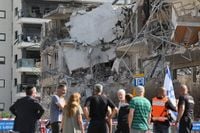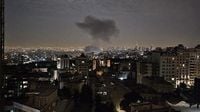On June 13 and 14, 2025, a dramatic escalation unfolded in the long-standing conflict between Israel and Iran, marked by devastating airstrikes, missile barrages, and a rising toll of casualties on both sides. The intense exchange of attacks has not only left neighborhoods in ruins but also raised fears of a wider regional war that could draw in global powers.
It began early on Friday when Israel launched its largest-ever air assault on Tehran’s nuclear and military infrastructure. The operation, dubbed "Rising Lion," targeted Iran’s nuclear program and key military commanders, including Revolutionary Guard Commander Hossein Salami, Chief of Staff Mohammad Hossein Bagheri, Emergency Forces Commander Gholam Rashid, and at least six top nuclear scientists. Israel’s strike destroyed the aboveground nuclear enrichment plant at Natanz, causing chemical and radiological contamination described as "manageable" by Rafael Grossi, head of the International Atomic Energy Agency (IAEA).
Satellite images and reports confirmed widespread damage across at least 15 Iranian locations, including Isfahan, Tabriz, Ilam, Lorestan, Borujerd, Qom, Arak, Urmia, Ghasre Shirin, Kermanshah, Hamedan, and Shiraz. The attacks crippled Iran’s radars, air defenses, ballistic missile capabilities, and wiped out senior military figures. Iran’s supreme leader, Ayatollah Ali Khamenei, declared war on Israel, vowing harsh punishment and revenge for the assault.
In response, Iran launched a massive retaliatory strike late Friday and into Saturday, firing hundreds of ballistic missiles and approximately 100 unmanned aerial vehicles (UAVs) targeting Israeli cities including Tel Aviv and Jerusalem. At least seven sites around Tel Aviv were hit, resulting in multiple injuries and the deaths of at least three Israelis, including one woman in Ramat Gan and two individuals in Rishon LeZion. Dozens more were injured, and buildings were severely damaged, with mangled and burned cars littering the streets.
Residents of Rishon LeZion, a city just outside Tel Aviv and among the worst-hit areas, described scenes of destruction. Ifat Benhaim and her family fled to their basement as air raid sirens blared, only to be shaken by a massive explosion that left their home with collapsed roofs and shattered glass. Two of their neighbors were killed in the missile barrage, underscoring the tragedy’s human toll. The family is now forced to move their possessions from the home they had lived in for 29 years, uncertain where they will stay next.
Iran’s attacks also caused casualties and destruction within its own borders. Iran’s state television reported that around 60 people, including 20 children, were killed in an Israeli strike on a housing complex in Tehran’s Saadat Abad district. Iran’s ambassador to the United Nations, Amir Saeid Iravani, informed the Security Council that 78 people had died and more than 300 were wounded in the strikes. Eyewitnesses described harrowing scenes of blood, burned feet, and widespread fear among civilians, especially children.
The conflict’s intensity has prompted urgent diplomatic efforts. British Foreign Secretary David Lammy expressed alarm and called for de-escalation, engaging in talks with Iranian Foreign Minister Abbas Araqchi and counterparts across the Middle East. Meanwhile, Lebanon announced plans to keep its airspace open despite rising tensions, with its national carrier increasing flights to compensate for delays.
Israel’s Defense Minister Israel Katz issued a stark warning to Tehran, stating, "If Khamenei continues to fire missiles at the Israeli home front, Tehran will burn," emphasizing that Iran would pay a "heavy price" for its actions. Iran, in turn, warned the United States, United Kingdom, and France against interfering by shooting down its missiles, threatening to target their bases and ships in the region if they intervened.
The United States has provided support to Israel’s defense, assisting in intercepting ballistic missiles launched by Iran using assets positioned in the eastern Mediterranean. The U.S. Navy’s aircraft carrier Carl Vinson and other military resources are deployed in the region to protect American forces and interests. President Donald Trump, navigating internal political divides, initially urged Iran to reach a nuclear agreement within a 60-day ultimatum but later praised Israel’s strikes as "excellent," while asserting the U.S. was not involved in the initial operations.
The conflict has also sparked debate within the U.S. political sphere. Former Fox News host Tucker Carlson accused President Trump of being "complicit" in Israel’s attacks, while Senator Lindsey Graham voiced strong support for Israel’s military actions to prevent a nuclear-armed Iran. Some factions within the MAGA movement expressed opposition, fearing the U.S. could be drawn into another Middle East war contrary to an "America First" agenda.
On the ground, Israeli cities have been rattled by missile strikes and drone incursions, with sirens blaring and residents seeking shelter in underground bomb shelters. In Jerusalem, Tel Aviv, and surrounding areas, families huddled together, their normal weekend plans upended by the looming threat. Iranian cities, too, have been engulfed in explosions and air defense fire, with civilians fearful and uncertain about the conflict’s trajectory.
The nuclear dimension of the conflict adds a perilous layer. While the IAEA confirmed that underground halls at Natanz were not struck, damage to power supplies may have affected centrifuges used for uranium enrichment. Facilities at Fordo and Isfahan were also reportedly attacked. The destruction of the aboveground enrichment plant at Natanz, where uranium was enriched to near 60 percent—just short of bomb grade—raises concerns about potential radiological hazards, though the agency has not detected dangerous levels outside the site.
The health risks from uranium and other radioactive materials remain a concern, as inhalation or ingestion can increase cancer risks, particularly thyroid cancer in children. However, no reports have confirmed a release of dangerous radiation resulting from the strikes so far.
As the conflict continues, the human cost and regional instability mount. The destruction of homes, loss of life, and widespread fear threaten to deepen divisions and prolong hostilities. The international community watches anxiously, urging restraint and diplomacy to prevent the war from spiraling further.
In the midst of this turmoil, families like the Benhaims face an uncertain future—displaced from their homes, grappling with loss, and caught in a conflict that shows no immediate signs of abating. The coming days will be critical in determining whether the region can avoid a broader conflagration or whether this latest chapter marks a dangerous new phase in Middle Eastern hostilities.


